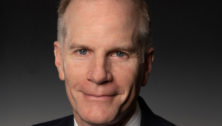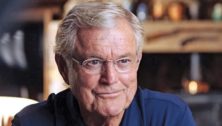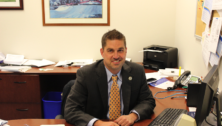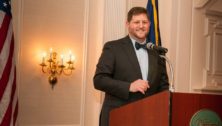Chester County Leadership: Colin Neill, Chancellor, Penn State Great Valley
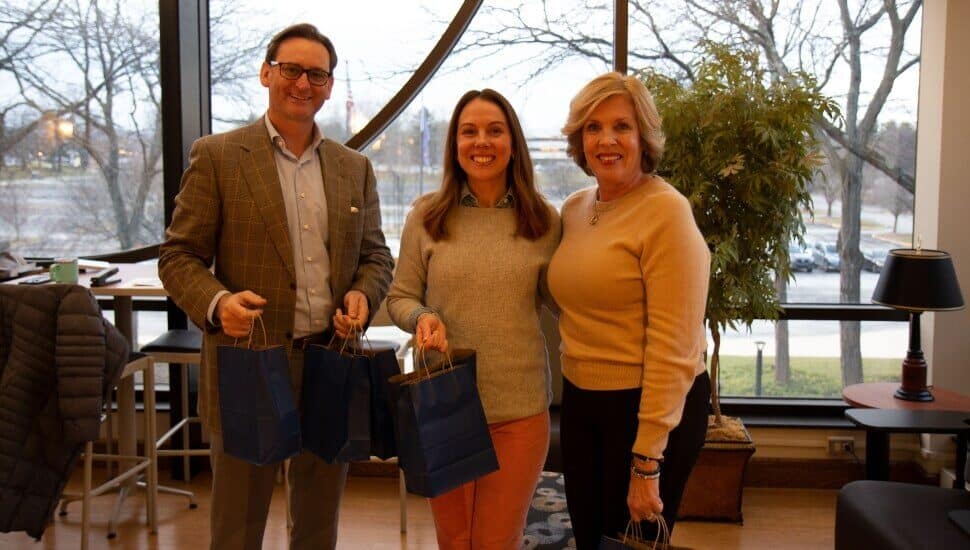

Colin Neill, Penn State Great Valley new Chancellor, spoke to VISTA Today about growing up in a working-class family in Kent, England, where he spent long days playing outside and played every sport he could. He also had a passion for learning and became the first in his family to attend college.
Neill also discussed new initiatives and priorities for Penn State Great Valley, including expanding alumni engagement and the importance of continuing remote education after the pandemic to reach more students. He also talked about the engineering mindset that keeps him positive when facing problems.
Where were you born, and where did you grow up?
I have a very working-class background. I was born the youngest of two kids in Kent, in England, in a town called Ashford. When I was growing up, Ashford was an hour and a half outside London. The high-speed train lines reduced that time to just 38-minutes and made Ashford more of a commuter town to London.
What did your parents do?
My dad was an architectural metal worker in a factory. When I was around 11 or 12, he moved into glazing for commercial buildings. Eventually, he became a senior contracts manager responsible for commercial glazing projects all over the U.K.
My mum raised my sister and me until we got to middle school, and then she worked in a wool shop – knitting was big in the U.K. Then she went into office work. She was a Section Head in the regional Magistrates Court when she retired.
What memories do you have of growing up in Ashford?
Ashford has changed a lot since I grew up. It was a relatively densely populated area, but it was five or 10 minutes until you were in the countryside. I took my children there over the summer and saw that urban sprawl has taken over all the places I remembered as a kid.
So, all that time, I was out and about. I would disappear for the entire day and forget what time it was. It was a safer time, or we thought it was safer back then. I have fond memories of childhood.
Because I grew up in a relatively lower economic area, at least in the U.K. at that time, the predominant feeling was, “Don’t do well at school. You’re trying too hard if you do well at school.” That was always a struggle for me because I valued school. We used to get our grade reports on this little slip of paper, and I would have to hide mine so that no one could see it because I knew I’d get bullied if they saw it.
Where does your appreciation for education come from?
Definitely from my parents! Both of my parents left school at 16, which is the legal age you can leave school in the U.K. They’re both smart, but they didn’t have the opportunity. So they always instilled in my sister and me the value of education.
They never talked about us going to college. Still, we did have the opportunity to leave our comprehensive school, the state high school, to go to grammar schools, selective schools you can join when you’re 12 or 13. There’s one school for boys and another for girls in the entire town, and the kids with the best grades get to go. I was one of five boys from my school of maybe 200. That took us out of that environment where grades were something you had to hide into an educational environment where people were talking about going to college.
Did you play any sports as a kid?
Yes, I played every sport I could. I played what would be considered varsity sports here – basketball, cricket, soccer, field hockey, and tennis. I also played basketball in college, so I was a student-athlete, but that means a very different thing in the U.K. than it does here.
Do you have a favorite memory from playing basketball?
One time we were playing another school at basketball. I remember anticipating what was going to happen. I was on defense on the right side, watching the ball come down, and I knew that the player with the ball was about to throw it into the post on the other side. I sprinted straight across, jumped up, and timed it perfectly – just took the ball straight out of the air. I still remember that moment. It was the first time that I felt the game slowed down and I could read the situation.
How about work? Did you work when you were younger?
Yes. None of the jobs I had were jobs anyone would want to do, but they were a way to make money. In the summers, I would sign on to temporary labor agencies and go wherever they needed work that day. I did a lot of manual labor. I knew the value of hard work from my parents, who worked very hard, but when you experience it yourself, that’s a different thing.
One I did for quite a while was unloading trucks of bananas that come over on these massive containers. I did that all day. It was backbreaking work. I also worked in an ice cream factory and a boiled egg factory. There was a conveyor belt to peel the eggs – not the most pleasant experience.
What about music? Did music play a role in your life?
I wish I could play music, but I do love music. There was a lot of music in my house. I remember one time I was in the car with the whole family. Simon & Garfunkel was playing, and we sang along to “Parsley, Sage, Rosemary, and Thyme.” We sang a lot in the car together on trips and my wife and I do so with our kids now. Doesn’t everyone?
Did you have a favorite artist while you were growing up?
We always listened to a lot of Elvis and Johnny Cash, and what I know now as being outlaw country. My dad liked that a lot. My mum was more into the Rolling Stones and Elvis.
When I was older, I grew up in the era of what’s called Britpop, Oasis, and Blur, and a host of other bands of that era, which is still my favorite music to listen to. But I’m glad I’ve not fallen into that trap of thinking that music is terrible today. I listen to a lot of contemporary pop music with my kids.
Where did you end up going to university, and why there?
I thought that a college education meant getting as far away as possible from my hometown. I went to the University of Wales at Swansea, on the other side of the country.
It’s in a beautiful location – right down on the shoreline with beaches. It’s an area called the Gower Peninsula, which has great rock climbing, which I didn’t realize I was interested in at the time, but I did get interested in it, along with kayaking and caving. There were a lot of outdoor activities at that campus. And it’s a self-contained campus. Many London campuses are just like in downtown Philly. I really wanted it to be a university campus.
Looking back, was that the right choice for you?
It’s worked out. I didn’t apply for Oxford or Cambridge because I always felt that was where private-school-tutored kids went. The odd thing is that when I went to the University of Wales, many of my friends, most of whom were from Wales, heard my accent and immediately assumed that I came from a well-to-do family. I know the difference between a working-class British accent and an upper-class British accent, but they didn’t, so they just made this assumption about me. Ironically, it was only because of the fact that university education in the U.K. was free at that time, that I was able to go.
Looking back over your career up until today, Colin, who were the people who saw promise in you?
There are a few people. The first would be the dean of engineering at the University of Wales, Prof. Mike Rodd. He was my adviser in my final year. He must have seen something in me because he asked if I would be interested in doing graduate work and found me the scholarship so I could do that. I worked in his research group.
He and some faculty across Europe ran a two-week summer school, essentially, where his grad students would take the undergraduate seniors to different locations – Karlsruhe, Delft, Valencia, Ghent. Faculty from all over Europe would teach them about artificial intelligence. This was in 1994 or 1995. I was a grad student and would take students in this program and mentor them.
Through that, I met a faculty member from the U.S. who was a British ex-pat, Dr. David Russell – he was from Liverpool originally. He was teaching in this summer school. I said to him, “I’ve always been interested in living and working in the U.S.” He said, “When the time’s right, and you’re interested in coming, let me know, and I’ll give you any advice I can.”
So, about 18 months later, I was finishing my post-doc, and I reached out to him. He said, “I can do more than give you some advice – we have a job opening that you can apply for.” He was the division head here back then. I interviewed over what’s now called Polycom, and I came out and taught a class in the summer to see if it would work. It worked out, so I moved out that following fall.
What do you think Prof. Rodd saw in you?
I don’t know, I should ask him! I was a good student. I was conscientious. I knew, and I’m guessing he saw this; I knew how lucky I was to have the opportunity. He saw that I was coachable and listened to the advice he gave.
So, here we are at the start of 2023. What are your priorities and initiatives you have underway?
There are a bunch of things. First, we are a graduate, professional school, so all of our graduates are graduates from somewhere else. Their affinity is to their undergraduate school, as most people’s affinity is because that’s where all the fun was. We have 10,000 graduates of our campus. We engage with so few of those alums. There’s a real opportunity to engage with people. How can we engage them back into our programs to show current and potential students the value of the education?
One example is a gentleman named Jeffrey Lipson, who spoke at our last commencement. He graduated from our program years ago and founded a cybersecurity company – Layer 8 Security. He remembered a little “aha” moment from a certain instructor and class, which he carried with him when he built his company. It resonated with him so much that he brought it back as a moment in his commencement speech.
We need more of those. We need to find where those people are. We have the opportunity with analytics to be more scientific about finding our alumni to re-engage with them.
We have grown our program offerings significantly over the years. We created a data analytics program and an artificial intelligence program. We are the face of online graduate engineering for Penn State as an institution. We are number three in the country for online graduate engineering programs.
We have different modes of delivery now that weren’t available before. We’ve got fully online courses that we’ve had for the last 10 to 15 years. And we have face-to-face classes, but in the pandemic, we had to pivot to offering classes online – remote, synchronous education. We did it really well because of our background in distance education. The university is coming around to the idea that that’s a mode of delivery you can have outside of the pandemic. There are still people working, and they still value an education, so we have to meet them where they are.
We face the challenge of declining undergraduate enrollment in the U.S. There’s a real question about the value of a four-year degree. The cost of education prices a lot of people out of the market, so we have to make sure that we deliver on the value that we promise.
What do you do with all that free time that you have, Colin?
Most of my free time is spent being my children’s Uber driver! My children are involved in all kinds of activities – Hebrew school, volleyball, field hockey, swimming, and soccer. They have richer social lives than I do.
The one thing that’s for me is that I play paddle tennis several times a week in a men’s league. It’s similar to pickleball. I would like it to be relaxing, but I didn’t play very well last night, so it wasn’t too relaxing.
Do you read much?
I do. I really enjoy reading and love my Kindle. I read nothing of substance. They’re all spy novels or lone-wolf hero novels.
It’s a crazy world out there, Colin. What keeps you hopeful?
When minor crises happen at work that I have to deal with, people always say, “It must be a tough day today.” My answer is always, “It’s just the latest problem I need to solve.” It’s my engineering mindset. Rather than dwell in the moment and get angst-ridden, I think there’s got to be a solution somewhere. Sometimes those solutions are hard to find, but that’s the challenge.
That approach means that I don’t have to be hopeful, necessarily – I just have to be pragmatic. I try to be a positive force for everybody here.
Finally, Colin, what’s the best advice you have ever received?
The best advice I’ve gotten is to show people some grace. There’s also Hanlon’s razor, which says, “Don’t attribute to malice what can be explained by stupidity,” which is a more negative version of the same principle. It’s so easy to attribute meaning to what people are saying or doing when that might not be the case.
In my mind, everyone’s a rational actor and is working in their own self-interest, so my job as a leader is to align those interests. If somebody gets frustrated with somebody else and doesn’t understand why they’re doing what they’re doing, show them some grace.
I don’t remember for sure where I heard that, but I’d imagine it was Prof Rodd. He lived in South Africa during apartheid, and although he was white, he hated apartheid and knew the destruction it was causing. But he, like Nelson Mandela, knew that healing had to come from grace.
My dad is a Protestant from Northern Ireland, from Belfast. My mother is a Catholic from England, so when they married, his family didn’t know she was a Catholic because of the problems in Belfast then. He didn’t return home for years because it was economically difficult and it was a dangerous place to visit. One of his nieces, Anne Beattie, was one of the leaders who brought peace to Northern Ireland by telling people, “You’ve got to forgive the sins of the past. Otherwise, we’re never going to move forward.” So, a few different people have demonstrated to me the value of grace.
Connect With Your Community
Subscribe to stay informed!
"*" indicates required fields




















![95000-1023_ACJ_BannerAd[1]](https://vista.today/wp-content/uploads/2023/03/95000-1023_ACJ_BannerAd1.jpg)
























